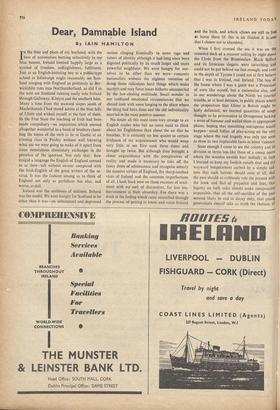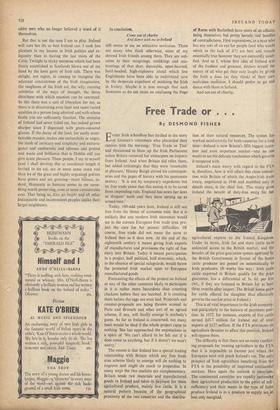Dear, Damnable Island
By IAIN HAMILTON
TN the time and place of my boyhood, with the bees of nationalism buzzing seductively in my blue bonnet, Ireland loomed happily large as a symbol of freedom, unEnglishness, fulfilment. Just as an English-imitating boy at a public-type school in Edinburgh might reasonably see Scot- land merging with England as painlessly as Ber- wickshire runs into Northumberland, so did I in the west see Scotland running easily into Ireland through Galloway, Kintyre and the southern Isles. Many a time from the seaward slopes south of Machrihanish I had stared across at the blue hills of Ulster and wished myself at the foot of them. In the Free State the teaching of Irish had been made compulsory—an imposition which seemed .altogether wonderful to a band of brothers chant- ling the tenses of the verb to be in Gaelic at an evening class in Paisley without well knowing what use we were going to make of it apart from some ostentatious elementary exchanges in the presence of the ignorant. Not only that : how insipid a language the English of England seemed to us then—salt without savour compared with the Irish-English of the great writers of the re- vival. It was the fashion among us to think of England not only as perfidious but also, and worse, as dull.
Ireland was the antithesis of dullness. Ireland was the model. We were hungry for Scotland to be other than it was—an unbalanced and depressed nation clinging frantically to some rags and tatters of identity although it had long since been digested politically by its much larger and more powerful neighbour. We were hungry for our- selves to be other than we were—romantic nationalists without the slightest intention of doing those ridiculous hard things which make martyrs and may force issues hitherto unsuspected by the law-abiding multitude. Small wonder in our confused emotional circumstances that we should look' with some longing to the place where the thing had been done and the old individuality asserted in the most positive manner.
No doubt all this must seem very strange to an English reader who has no more need to think about his Englishness than about the air that he breathes. It is certainly no less quaint to certain Irishmen of my acquaintance who would weep very little to see Eire sunk three times and brought up twice. But although time brought a closer acquaintance with the complexities of reality and made it necessary to take off the fancy dress of adolescence and recognise soberly the massive virtues of England, the sharp-toothed vices of .Ireland and the common imperfections of all, I look back now on those excesses of senti- ment with no sort of discomfort, far less em- barrassment at their absurdity. For there was a truth in the feeling which came unscathed through the process of getting to know and value Ireland and the Irish, and which allows me still to feel at home there (if this is an illusion it is ,one that I choose not to abandon).
When I first crossed the sea it was on the crowded deck of a steamer sailing by night down the Clyde from the Broomielaw. Black Belfast and its ferocious slogans were uninviting and could not be put behind me fast enough; and even in the depth of Tyrone I could not at first believe that I was in Ireland, real Ireland. The boy of the house where I was a guest was a Protestant of sorts like myself, but a nationalist also, and in our wanderings about the North we courted trouble, or at least derision, in public places where the proposition that Ulster is British might be hotly defended; we learned quantities of songs thought to be provocative to Orangemen lacking a sense of humour and wailed them in appropriate places, hoping that something outrageous would happen—small follies of play-acting on the very stage where the real tragedy was only too soon to show its two implacable faces in bitter violence.
Soon enough I came to see the country and its division in terms less like those of a comic opera where the wooden swords hurt nobody; in time I learned to keep my foolish mouth shut and MY wayward temperament curbed by a simple sad- ness that such hatreds should exist at all, that the past should so ruthlessly rule the present with the hook and flail of prejudice and fear, that bigotry on both sides should make compromise impossible, that all the self-sacrifice of the past seemed likely to end in decay only, that, young generations should take as truth the rhetoric of older men who no longer believed a word of it themselves.
But that is not the tune I am to play. Ireland will cure her ills as best Ireland can. I took less pleasure in my lessons in Irish politics and re- ligiosity than in having the last mists of the Celtic Twilight (a sticky nonsense which had been firmly established in Scotland) blown out of my head by the keen gusts of Irish talk. There was delight, not regret, in coming to recognise the adamant concreteness of the Irish imagination, the toughness of the Irish wit, the wily, cunning subtleties of the ways of thought, the fierce directness with which emotion can be conveyed. In this there was a sort of liberation for me, as there is in discovering even finer and more varied qualities in a person long admired and with whose faults you are sufficiently familiar. The stimulus of Ireland had never failed me, has indeed grown sharper since I dispensed with green-coloured glasses. If the decay of the land, for easily ascer- tainable reasons, makes one melancholy or angry, the mesh of intricacy and simplicity and extrava- gance and conformity and idleness and protest and waste and brilliance that is Dublin still can give acute pleasure. These people, I say to myself (and I shall develop this at inordinate length if invited to do so), are in some sense more real than we of the great and highly organised polities have grown and are growing—more hdman, in- deed. Humanity in humans seems to me some- thing worth preserving, even at some considerable cost. That being so, Eire go brath! and all other indomitable and inconvenient peoples unlike their larger neighbours. In conclusion,
Come out of charity And dance with me in Ireland
still seems to me an attractive invitation. There are many who think otherwise, some of my shrewd Irish friends among them. They are wel- come to their misgivings, mislikings and mis- trustings of that dear, damnable, open-hearted, hard-headed, high-explosive island which few Englishmen have been able to understand save by the desperate expedient of outdoing the Irish in Irishry. Maybe it is true enough that such Scotsmen as do not insist on confusing the Pope of Rome with Beelzebub have more of an affinity, being themselves but pretty loosely tied bundles of contradictions. First impressions; to a man who has any sort of an eye for people (and who would admit to the lack of it?) are best and remain essentially true however they are outwardly modi- fied. And so I, whose first idea of Ireland was of the freshest and greenest, declare myself the enemy of all who get their easy laughs by giving the Irish a dose (as they think) of their own malicious medicine. I should prefer to go and dance with them in Ireland.
And not out of charity.















































 Previous page
Previous page